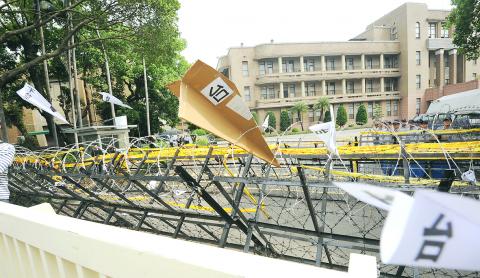Several groups yesterday rallied outside the Executive Yuan in Taipei, accusing the government of conceding to Beijing on the controversial M503 flight route in exchange for easing regulations on Chinese air passengers making transit stops in Taiwan.
Beijing launched its first flights using the new M503 route — which runs close to the median line of the Taiwan Strait — on Sunday.
Led by Economic Democracy Union convener Lai Chung-chiang (賴中強), the protesters accused the government of engaging in a “deal with the devil,” saying that the M503 route would threaten Taiwan’s national security.

Photo: Liu Hsin-de, Taipei Times
Beijing does not allow Chinese nationals to make transit stops in Taiwan en route to other nations, as it reportedly does not want them to have to show their passports in Taiwan during such stops — a requirement that some observers have said would signify that Beijing sees Taiwan as a separate country.
The Straits Exchange Foundation last year launched negotiations on the transit issue, saying the prohibition has put Taiwanese airlines at a disadvantage against their regional rivals.
Critics say President Ma Ying-jeou’s (馬英九) administration has jeopardized national security with its “careless” negotiations and the M503 route should not be used as a “bargaining chip” in exchange for economic growth spurred by Chinese tourists.

Photo: Liu Hsin-de, Taipei Times
“While China advances step by step, the Ma Ying-jeou administration has ordered a total retreat,” Lai said.
The protesters demanded that Premier Mao Chi-kuo (毛治國) and Mainland Affairs Council Minister Andrew Hsia (夏立言) resign over the matter.
Yesterday’s rally also drew support from residents affected by the Taoyuan Aerotropolis project — a proposed development that would see commercial and residential areas, as well as a free economic pilot zone, established near Taiwan Taoyuan International Airport.
The aerotropolis project is being built primarily to accommodate the expected massive influx of Chinese tourists on transit stops in Taiwan, the protesters said.
They said they opposed the development plan because it would lead to the relocation of Taoyuan Naval Base — where P-3C maritime patrol aircraft are stationed — to Pingtung County, creating a gap in national defenses against China.
The aerotropolis project is expected to require the seizure of about 3,130 hectares of land that is home to about 46,000 people, making it the largest eviction plan in the nation’s history.
Meanwhile, lawmakers questioned Hsia yesterday about a discrepancy in the number of flights that used the M503 route on Sunday. China said 33 civilian flights used the route, while Taiwan said it counted 32.
Hsia said the total was 31 on Sunday, plus one Cathay Pacific flight at 1am yesterday.
“China had the 33 figure because it was the total number scheduled for Sunday,” Hsia said in response to a question during a meeting of the legislature’s Internal Administration Committee.
In presenting a report and answering questions at the meeting, Hsia said that surveillance did not detect any Chinese military aircraft using the new flight route.
Ministry of National Defense officials said that radar stations that can track Chinese People’s Liberation Army (PLA) jet fighters detected no such military activities in the M503 flight zone on Sunday.
“Our military intelligence units and radar stations will continue their round-the-clock surveillance and tracking of Chinese PLA aircraft activity,” the ministry said in a statement.
Additional reporting by Jason Pan

AGING: As of last month, people aged 65 or older accounted for 20.06 percent of the total population and the number of couples who got married fell by 18,685 from 2024 Taiwan has surpassed South Korea as the country least willing to have children, with an annual crude birthrate of 4.62 per 1,000 people, Ministry of the Interior data showed yesterday. The nation was previously ranked the second-lowest country in terms of total fertility rate, or the average number of children a woman has in her lifetime. However, South Korea’s fertility rate began to recover from 2023, with total fertility rate rising from 0.72 and estimated to reach 0.82 to 0.85 by last year, and the crude birthrate projected at 6.7 per 1,000 people. Japan’s crude birthrate was projected to fall below six,

Conflict with Taiwan could leave China with “massive economic disruption, catastrophic military losses, significant social unrest, and devastating sanctions,” a US think tank said in a report released on Monday. The German Marshall Fund released a report titled If China Attacks Taiwan: The Consequences for China of “Minor Conflict” and “Major War” Scenarios. The report details the “massive” economic, military, social and international costs to China in the event of a minor conflict or major war with Taiwan, estimating that the Chinese People’s Liberation Army (PLA) could sustain losses of more than half of its active-duty ground forces, including 100,000 troops. Understanding Chinese

US President Donald Trump in an interview with the New York Times published on Thursday said that “it’s up to” Chinese President Xi Jinping (習近平) what China does on Taiwan, but that he would be “very unhappy” with a change in the “status quo.” “He [Xi] considers it to be a part of China, and that’s up to him what he’s going to be doing, but I’ve expressed to him that I would be very unhappy if he did that, and I don’t think he’ll do that. I hope he doesn’t do that,” Trump said. Trump made the comments in the context

SELF-DEFENSE: Tokyo has accelerated its spending goal and its defense minister said the nation needs to discuss whether it should develop nuclear-powered submarines China is ramping up objections to what it sees as Japan’s desire to acquire nuclear weapons, despite Tokyo’s longstanding renunciation of such arms, deepening another fissure in the two neighbors’ increasingly tense ties. In what appears to be a concerted effort, China’s foreign and defense ministries issued statements on Thursday condemning alleged remilitarism efforts by Tokyo. The remarks came as two of the country’s top think tanks jointly issued a 29-page report framing actions by “right-wing forces” in Japan as posing a “serious threat” to world peace. While that report did not define “right-wing forces,” the Chinese Ministry of Foreign Affairs was